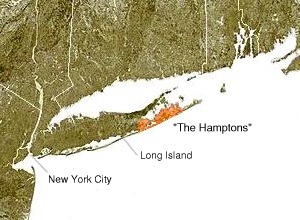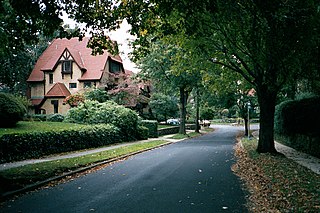Related Research Articles
The Worldwatch Institute was a globally focused environmental research organization based in Washington, D.C., founded by Lester R. Brown. Worldwatch was named as one of the top ten sustainable development research organizations by Globescan Survey of Sustainability Experts.

Sag Harbor is an incorporated village in Suffolk County, New York, United States, in the towns of Southampton and East Hampton on eastern Long Island. The village developed as a working port on Gardiner's Bay. The population was 2,169 at the 2010 census.

The Hamptons, part of the East End of Long Island, comprise a group of villages and hamlets in the towns of Southampton and East Hampton, which together form the South Fork of Long Island, in Suffolk County, New York. The Hamptons form a popular seaside resort and one of the historical summer colonies of the northeastern United States.

Southampton, officially the Town of Southampton, is a town in southeastern Suffolk County, New York, partly on the South Fork of Long Island. As of the 2010 United States Census, the town had a population of 56,790. Southampton is included in the stretch of shoreline prominently known as The Hamptons.

The Town of East Hampton is located in southeastern Suffolk County, New York, at the eastern end of the South Shore of Long Island. It is the easternmost town in the state of New York. At the time of the United States 2010 Census, it had a total population of 21,457.

Peconic County is a proposed new county on Long Island in the U.S. state of New York that would secede the five easternmost towns of Suffolk County: East Hampton, Riverhead, Shelter Island, Southampton and Southold, plus the Shinnecock Indian Reservation.

The South Fork of Suffolk County, New York, United States is a peninsula in the southeastern section of the county on the South Shore of Long Island. The South Fork includes most of the Hamptons. The shorter, more northerly peninsula is known as the North Fork.

Grosvenor Atterbury was an American architect, urban planner and writer. He studied at Yale University, where he was an editor of campus humor magazine The Yale Record After travelling in Europe, he studied architecture at Columbia University and worked in the offices of McKim, Mead & White.

The Montauk Branch is a rail line owned and operated by the Long Island Rail Road in the U.S. state of New York. The branch runs the length of Long Island, 115 miles (185 km) from Long Island City on the west to Montauk on the east. However, in LIRR maps and schedules for public use the term Montauk Branch refers to the line east of Babylon; the line west of there is covered by Babylon Branch schedules, and a few Montauk Branch trains operate via the Main Line west of Babylon due to increased track capacities.

The Meigs Raid was a military raid by American Continental Army forces, under the command of Connecticut Colonel Return Jonathan Meigs, on a British Loyalist foraging party at Sag Harbor, New York on May 24, 1777 during the American Revolutionary War. Six Loyalists were killed and 90 captured while the Americans suffered no casualties. The raid was made in response to a successful British raid on Danbury, Connecticut in late April that was opposed by American forces in the Battle of Ridgefield.

Mercator Cooper was a ship's captain who is credited with the first formal American visit to Edo, Japan and the first formal landing on the mainland East Antarctica.
The Manhattan was a United States whaling ship under Captain Mercator Cooper that made the first authorized visit of an American ship to Tokyo Bay, in 1845.

Pyrrhus Concer was a former slave from Southampton, New York who was aboard the whaling ship Manhattan that was the first American ship to visit Tokyo in 1845.

Barbara Elaine Smith, professionally known as B. Smith, was an American restaurateur, model, author, businesswoman and television host.
Lifestyles of Health and Sustainability (LOHAS) is a demographic defining a particular market segment related to sustainable living, "green" ecological initiatives, and generally composed of a relatively upscale and well-educated population segment. The author Paul H. Ray, who coined the term Cultural Creatives in his book by the same name, explains that "What you're seeing is a demand for products of equal quality that are also virtuous." Included in the cultural creative demographic are consumers of New Age goods and services.

Anna Lappé is an American author and educator, known for her work as an expert on food systems and as a sustainable food advocate. The co-author or author of three books and the contributing author to over ten others, Lappé's work has been widely translated internationally and featured in The New York Times, Gourmet, O, The Oprah Magazine, Domino, Food & Wine, Body+Soul, Natural Health, Utne Reader, and Vibe, among other outlets.

Danielle J. Nierenberg is an American activist, author and journalist.

Edible Brooklyn is a Brooklyn-based food magazine and website that covers local food and drink culture, restaurants, ethnic eats, farmers markets, food-related events or articles on things like a live poultry market in Williamsburg, and recommendations like "Late Night Nosh." The magazine also hosts regular events such as Brooklyn Uncorked and Good Spirits Brooklyn as well as short videos and interviews called Edible Films. The publication received a James Beard Foundation Award in 2010 for its food-related columns. Editor Rachel Wharton authored Edible Brooklyn: The Cookbook in 2011.

Edible Manhattan is a food magazine and website that covers local food and drink makers, restaurants, farmers markets, food culture and events in Manhattan. The publication also hosts various events including Edible Escape, Good Beer and Good Cider.
Edmund David Hollander is an American landscape architect and educator. The New York City native is president of Hollander Design Landscape Architects, a New York-based firm incorporating environmental planning, landscape design and horticulture which has provided services for residential, commercial and public projects. Hollander has taught extensively at the Graduate School of Fine Arts at the University of Pennsylvania and at City College of New York. The cornerstone of Hollander's landscape practice is his theory of The Three Ecologies: Ecology of site, Human Ecology, and the Ecology of Architecture. As Hollander wrote in the introduction to his most recent book The Good Garden: “A powerful landscape unfolds like a story. Your land is your home and within your home is the house."
References
- ↑ Edible Manhattan "Brian Halweil author page". Archived from the original on 1 June 2014. Retrieved 18 June 2014.
- 1 2 Susan M. Novick (November 14, 2008). "Table's Bounty: Keeping It Local". The New York Times. Retrieved May 21, 2015.
- ↑ "Eating Sustainable Seafood - Three Tips to Steer Clear of Fisheries Collapse". Worldwatch Institute. Retrieved May 21, 2015.
- ↑ Worldwatch Institute "Brian Halweil bio page" . Retrieved 18 June 2014.
- 1 2 Staff Writer (February 24, 2015). ""40 Under 40" Earned". 27east. Retrieved May 21, 2015.
- 1 2 "40 Under 40 Awards – January". Long Island Business News. Retrieved May 21, 2015.
- ↑ Mary Harrison (May 22, 2012). "The farm on the Farm". The Stanford Daily. Retrieved May 21, 2015.
- ↑ "Brain Halweil Bio". Worldwatch Institute.
- ↑ "About Brian Halweil". Edible Manhattan. Archived from the original on 2014-06-01. Retrieved 2014-06-18.
- ↑ "Weddings: Sarah Horton, Brian Halweil". The New York Times. June 23, 2002. Retrieved May 21, 2015.
- ↑ Emily J. Weitz (August 28, 2013). "Urban Zen Initiative Brings Alternative Therapies to Southampton Hospital". The Sag Harbor Express. Archived from the original on May 22, 2015. Retrieved May 21, 2015.
- ↑ "heritage laying ducks". A Chef in the Field, Duck Eggs, T Magazine.
- ↑ Sergei Klebnikov (July 18, 2012). "Brian Halweil: Eat Locally, Save The World". The Independent. Archived from the original on May 22, 2015. Retrieved May 21, 2015.